
Caryma Sa’d is an Ontario lawyer who operates a protest-focused content business via @CarymaRules (X) and @carymasad (IG). Her coverage, partly crowdfunded, centers on pro-Palestinian protests and has drawn criticism for exposing activists to harassment and job loss.
Through @CarymaRules & @carymasad, Ontario lawyer Caryma Sa’d runs a partially crowdfunded protest-monitoring business. Critics argue her coverage misrepresents pro-Palestinian activism, exposes protesters to harassment, and has led to workplace firings, despite neutrality claims
LAW
Caryma Sa’d was previously active as a tenant/landlord lawyer in Ontario and continues to hold a license with the Law Society of Ontario.
Focus on Pro-Palestinian Protests Since late 2023 Caryma has posted extensive documentation of pro-Palestinian marches and rallies, frequently filming participants at close range. Protesters who attempt to shield their faces are often filmed more aggressively, and the resulting footage is published online without blurring. Her account occasionally prompts followers to identify individuals, a practice critics say invites harassment. In November 2023, Caryma posted a video of restaurant staff in Toronto cheering during a pro-Palestinian march. Soon after, CBC News reported that multiple employees of Moxies were fired after the footage circulated (see below). This case has been cited by advocacy groups as evidence of how her coverage can contribute to professional and personal repercussions for participants, contradicting claims from her videographer that the platform avoids “doxxing” or targeting individuals.
Framing and Narrative Tactics Caryma’s critics argue her protest-surveillance business relies on selective framing and misrepresentation to attempt to delegitimize pro-Palestinian activism. Several examples illustrate this pattern and more can be seen on her X account:
A line of drummers leading a march was described as giving the protest a “militaristic tone and sense of urgency.” Critics say this reframes cultural expression as threatening, fitting a broader pattern of criminalization by suggestion. In one widely criticized instance, Caryma amplified a blogger’s claim that an elderly pro-Palestinian activist was “of interest to Canadian intelligence.” The activist had previously filed a four-year complaint alleging CSIS surveillance, which was formally dismissed in 2017 by the Security Intelligence Review Committee. According to CBC News, the dismissal found no evidence to support claims of CSIS targeting (see links).
Critics argue that by repeating the claim without context, Caryma created the false impression that the activist remained under surveillance, when in fact the matter had been resolved. This has been identified as misinformation by insinuation — planting an unfounded suggestion that a lawful activist might pose a security threat.
Given CSIS’s documented history of disproportionately surveilling Muslim, Arab, and pro-Palestinian communities in post-9/11 Canada (see below) the activist’s complaint, while dismissed, was not inherently unreasonable — yet Caryma’s omission of that broader social context deepens the misrepresentation.
Protesters who resist intrusive close-range filming are often framed as abusive on Caryma’s accounts. Captions have invoked language such as “a look of pure hatred and contempt” or described reactions as “abuse of independent media.” While a small number of activists have at times reacted emotionally — sometimes pushing or grabbing cameras — critics note these are rare exceptions among thousands filmed. They argue such incidents are often provoked by Caryma and her team’s aggressive filming style, which many describe as an invasion of privacy, even in public settings.
Caryma and her team, which include videographer Adam Lee Wasserman, frequently counter this criticism with the one-liner: “You can’t expect privacy in a public space.” Legally, this is true — Canadian law generally permits filming in public. However, critics argue this misses the point: the videos posted on her account are not neutral records but are selectively framed and disseminated to a largely conservative, right-wing, and pro-Israel audience of 63,000 followers.
Posts often include unblurred faces, and in recent years, Caryma has begun posting full names and affiliations of activists. According to observers, this exposes individuals to harassment and doxxing, a risk Caryma is fully aware of given the online behaviour of her audience. Critics argue that by characterizing refusal to be filmed as harassment, while she herself publishes people’s identities without consent, Caryma inverts the reality of the situation.
Activists contend that this dynamic functions as a form of covert cyberbullying: those filmed– many of whom are racialized, Muslim or LGBTQ+ – are left with no real avenue of recourse, while the posts remain online to fuel hostile narratives against them. In practice, this dynamic leaves vulnerable individuals disproportionately targeted while Caryma’s platform and platforms themselves, benefits from heightened engagement whenever reactions occur.
Taken together, these patterns form what critics call an attempt at delegitimization: reframing lawful protesting as aggressive or unlawful while omitting the provocations and power imbalance inherent in surveillance-style documentation. Analysts argue that this combination of aggressive surveillance, misleading framing, targeted exposure, and lack of recourse constitutes a form of harassment and misinformation targeting pro-Palestinian advocacy and other vulnerable individuals and groups.
Additionally, while not every post portrays protests as dangerous, critics argue Caryma’s influence lies in her and her videographer Adam Lee Wasserman’s careful selection of moments and individuals. They consistently highlight protesters who resist being filmed, post unblurred faces, and sometimes present information with a mocking tone. Even when she avoids directly labeling participants as threatening, observers note that her audience of largely conservative and pro-Israel followers “picks up the slack” by launching harassment campaigns.
Critics emphasize that this selective amplification creates a distorted picture of the demonstrations. If a viewer only follows Caryma’s posts, they might assume that pro-Palestinian marches consist mainly of hostile encounters or moments of tension. In reality, these events are marked by camaraderie, cooperation across faiths, tolerance of differences in opinion, and even open debates with counter-protesters. Not surprisingly, when Caryma’s team isn’t there many of these incidents do not occur. By leaving out these human elements and reality, and focusing instead on heated exchanges or clips likely to spark engagement, critics argue Caryma misrepresents the broader character of the movement.
Police Involvement Caryma frequently references law enforcement in her posts, tagging @TorontoPolice and characterizing protest incidents as matters for police or intelligence services. She and her team have filed reports against protesters; at the same time, multiple complaints have been filed against them.
Independent reporting by Elisa Hategan in 2024 (see links) documented ongoing police investigations into Caryma’s conduct. Additional allegations have included physical altercations involving her videographer Mitch Hancock, with at least x1 case reportedly under review for possible charges.
Disputed Claims of Neutrality In September 2024, Caryma published a statement on X addressing criticism that her team provokes protesters:
“People often wonder what triggers the hostility we sometimes face within certain protest circuits. Part of the answer lies in the spread of false narratives, including claims that we intentionally provoke conflict or portray protesters unfairly … To be clear, if there were any actual provocation on our part, there would be endless footage circulating to prove it.”
Community critics contest this, pointing to videos and eyewitness accounts — including alleged instances of her videographer Mitch (@Mitch6669 on X) initiating physical violence and yelling at a group of pro-Palestinian protesters hoping they all “get blown up” — as evidence contradicting her claim.
Community Response Advocacy groups argue that Caryma and her team’s approach — combining intrusive filming, negative framing, and direct or indirect identification of participants — contributes to a climate of fear and attempted delegitimization of pro-Palestinian advocacy. Her work has been described in analytical terms as:
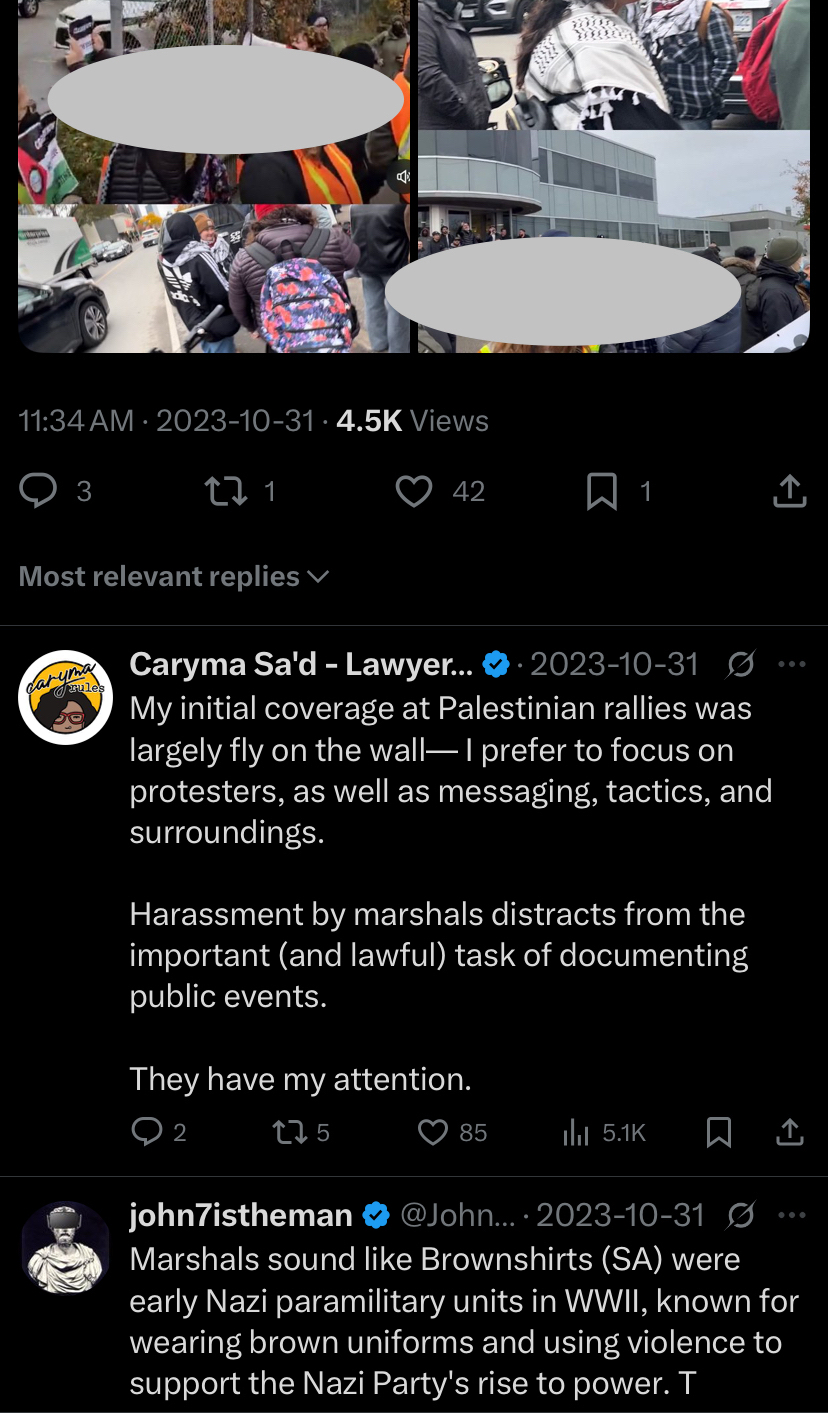
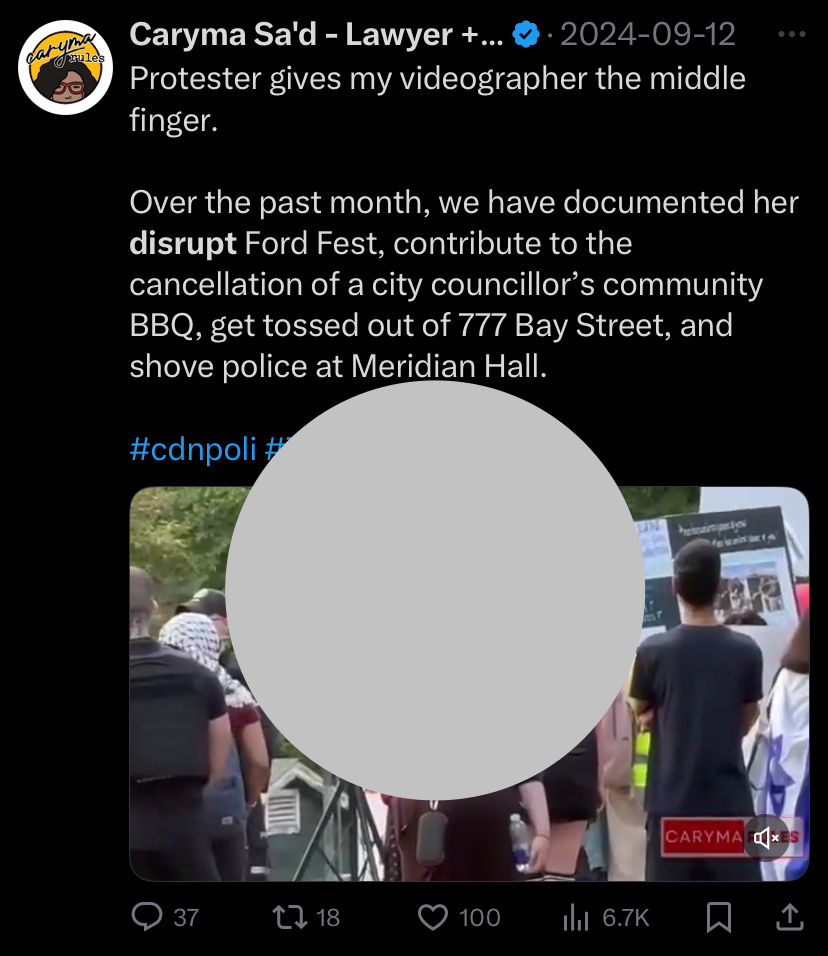
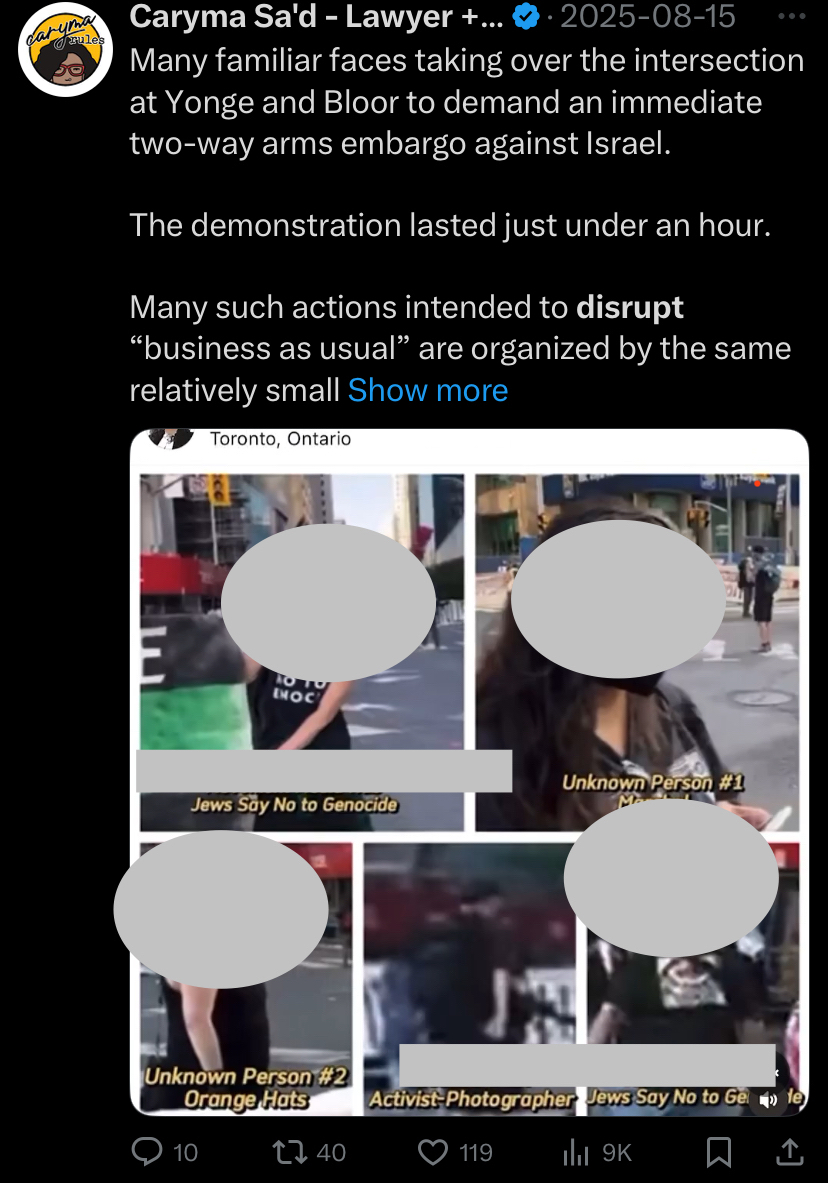
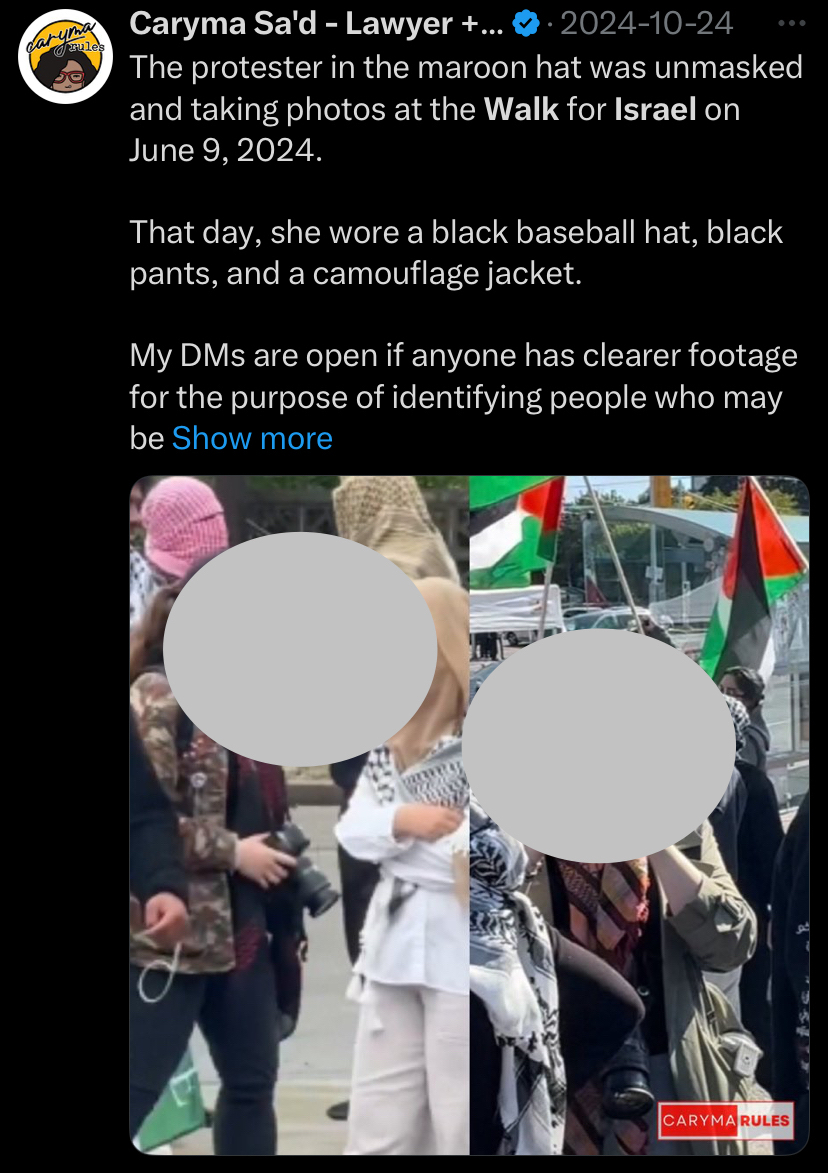
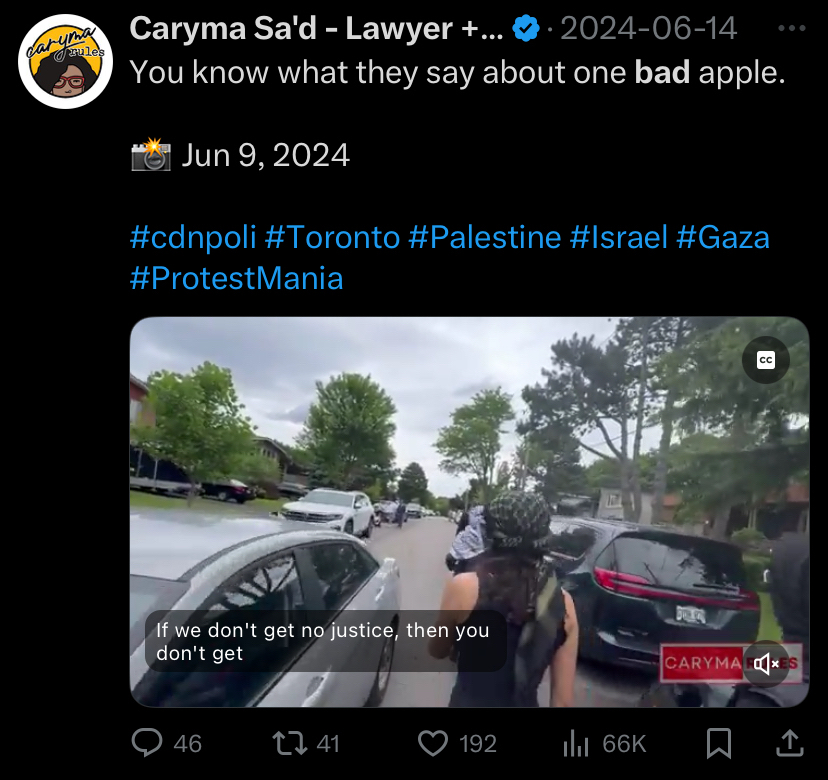
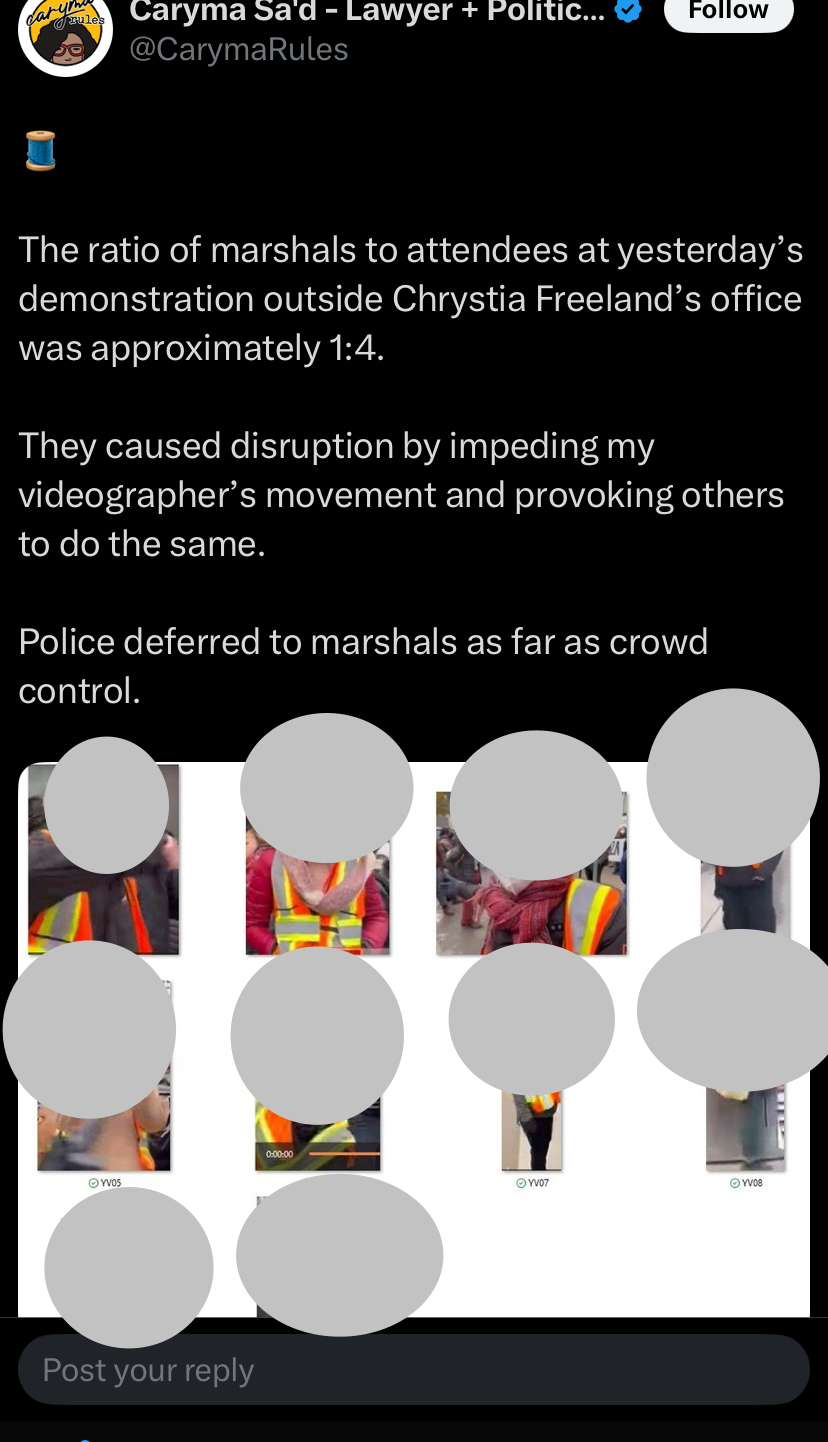
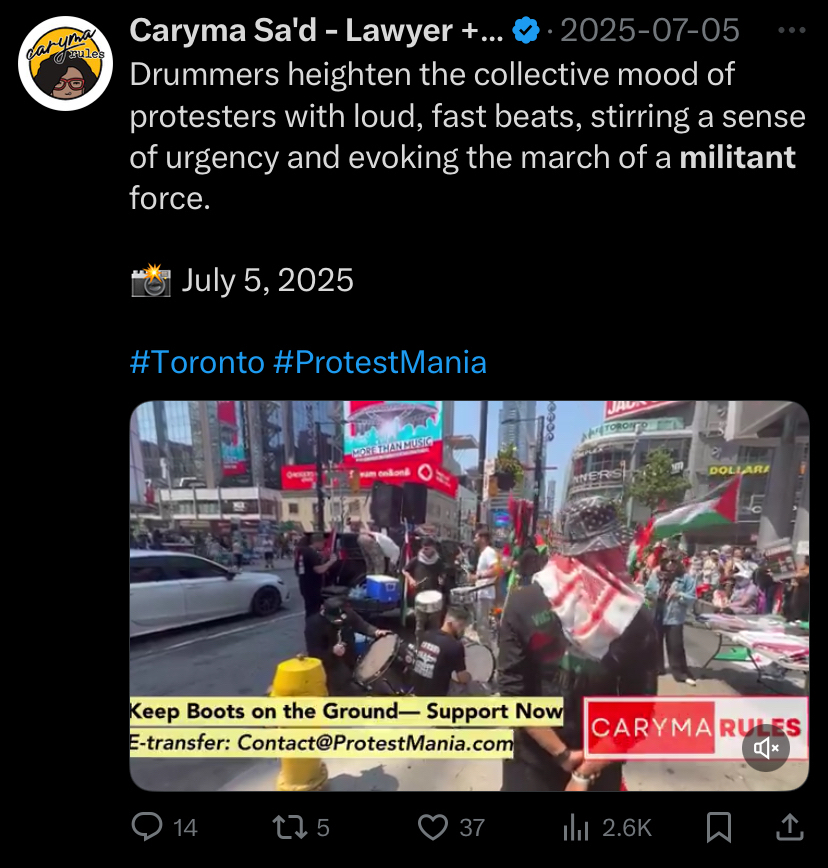
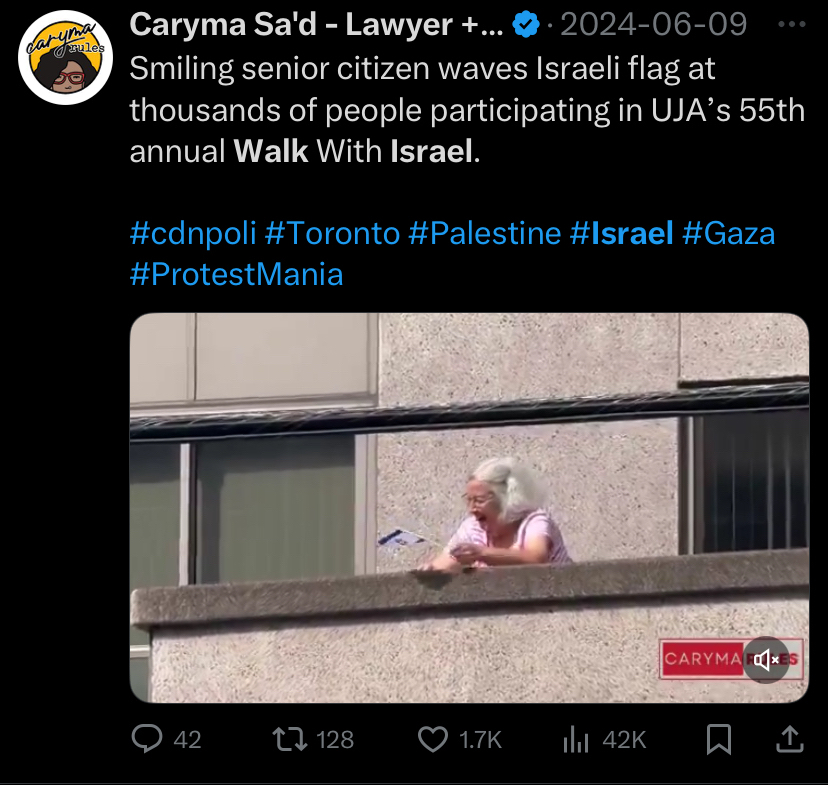
cbc.ca
🔒Tell us why Caryma Sa’d should be removed by emailing us at [email protected]